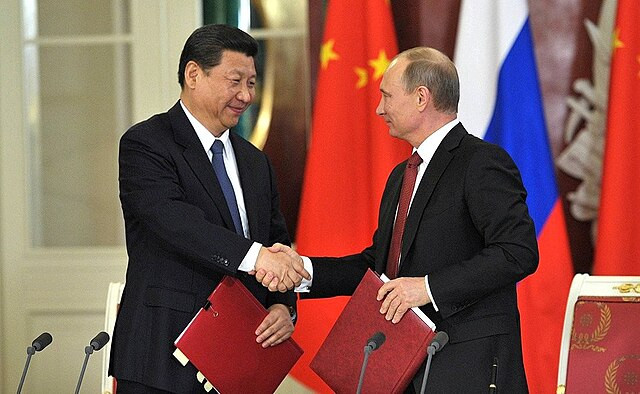Chinese President Xi Jinping arrived in Moscow on Wednesday for a four-day state visit at the personal invitation of Russian President Vladimir Putin, reinforcing their strategic alliance as Russia presses forward with its war in Ukraine. The visit coincides with Moscow's annual May 9 Victory Day parade, where Xi will serve as Putin's "main guest," underscoring what both leaders are framing as a united front against U.S. dominance.
Xi's arrival comes as Ukrainian drones targeted the Russian capital, temporarily halting operations at major airports just hours before his landing. Moscow Mayor Sergei Sobyanin said air defenses intercepted at least 14 drones overnight, with additional threats neutralized later in the day. Meanwhile, Kyiv reported a Russian airstrike killed a woman and her child.
Despite the tensions, Xi is expected to attend the Red Square military parade alongside leaders from 28 nations, including Brazil, Vietnam, and Belarus. Chinese troops will also march in the event. "The strong camaraderie between our two nations, forged in blood and sacrifice, surges onward unceasingly," Xi wrote in a signed article published by Russian state media.
Putin has pitched the Victory Day parade as a platform to demonstrate Russia's resilience on the world stage. The Kremlin has promoted Xi's visit as evidence that Russia is not diplomatically isolated, even as the war in Ukraine drags into its fourth year. Ukraine's Foreign Ministry, in response, called on nations to avoid participating in the parade, warning it undermines claims of neutrality.
During talks scheduled for Thursday, Xi and Putin will discuss cooperation on energy and security, including the long-delayed Power of Siberia-2 gas pipeline. Kremlin aide Yuri Ushakov confirmed that Ukraine and U.S. relations will also be on the agenda. Russian Foreign Ministry spokesperson Maria Zakharova called the visit "one of the central events in Russian-Chinese relations this year."
The state visit comes at a moment of heightened geopolitical volatility. China is locked in a bitter trade war with the United States, with tariffs on Chinese goods reaching 145%. Meanwhile, Washington and Kyiv recently signed a natural resources pact, further aligning the U.S. with Ukraine and raising questions in Moscow about shifting allegiances.
"Given the current American administration's policies towards China, China really needs Russia in many aspects - trade wise, energy resources wise," said Tamás Matura, a senior fellow at the Center for European Policy Analysis.
Analysts note that the timing of Xi's visit, paired with symbolic World War II commemorations, offers both countries an opportunity to champion multipolar global governance. "China and Russia will be signaling that there is still stability and credibility in international affairs and de-Americanization is already in progress," said Yun Sun, director of the China Program at the Stimson Center.
China has maintained it is neutral in the Ukraine conflict, though it remains Russia's top trading partner. Western governments allege that dual-use Chinese products like microchips are helping prop up Russia's defense sector. Beijing defends its trade with Moscow as "normal," while Xi continues to call for negotiations to end the war.
Xi's rhetoric continues to emphasize resisting foreign influence. "The two sides should jointly resist any attempt to disrupt and undermine China-Russia friendship and mutual trust," he stated in Russian media, echoing calls to preserve the post-war international order amid rising tensions with the U.S.






